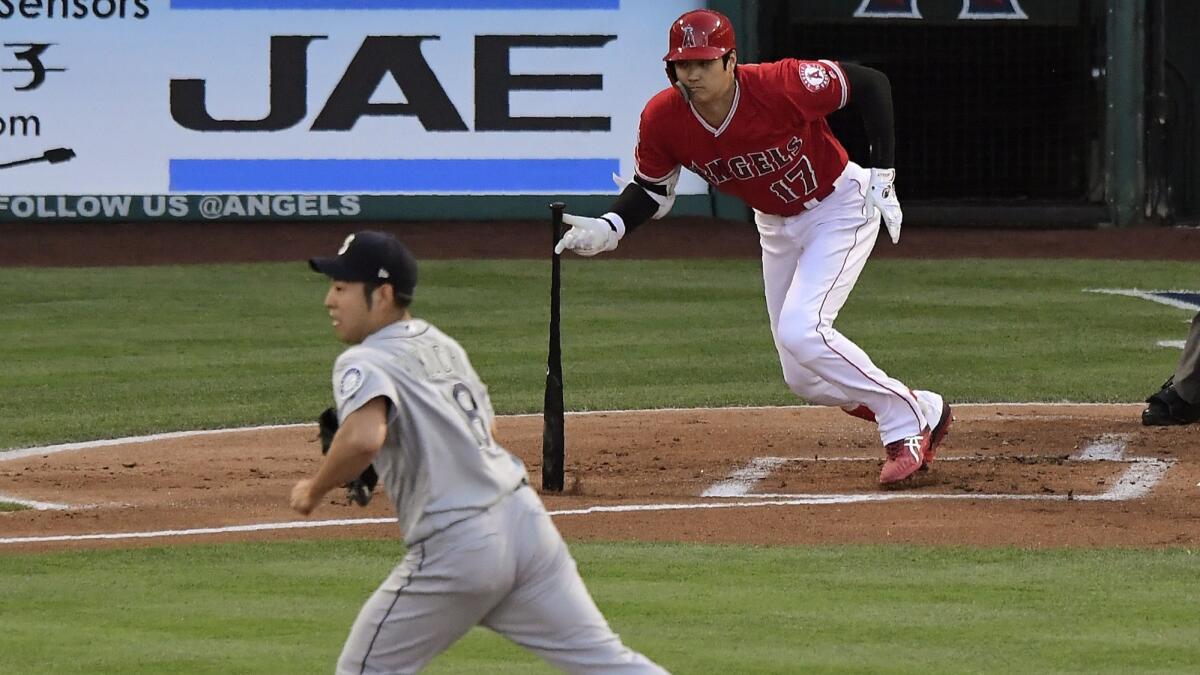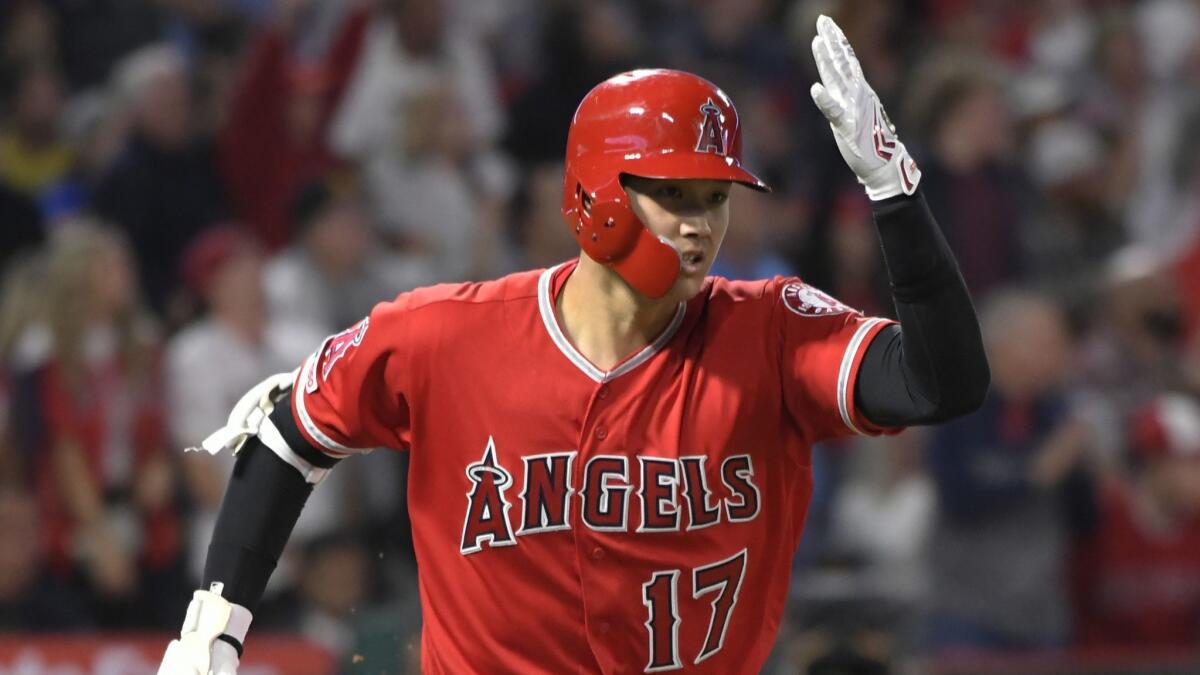Column: Shohei Ohtani and Yusei Kikuchi go from scrubbing toilets to living major league dream

Where they come from, there is plenty of open space.
Rice field after rice field after rice field. In the distance, mountains. In the winter, snow.
Shohei Ohtani and Yusei Kikuchi arenât from the parts of Japan that most people envision when they think of Japan.
They are from the countryside. The sticks. Or, as they would say in their own language, inaka.
How a high school in the rural northern region of Japanâs mainland produced two of the countryâs best players was already a subject of curiosity. Their legend continued to evolve Saturday, as the two graduates of Hanamaki Higashi High School in Iwate faced each other in the most competitive baseball league in the world, with Ohtani batting for the Angels and Kikuchi pitching for the Seattle Mariners.
Ohtani was the clear victor in the historic showdown at Angel Stadium, as he hit a fourth-inning home run on a curveball Kikuchi tossed over the middle of the plate.
His sixth blast of the season immediately followed homers by Tommy La Stella and Mike Trout, marking the first time in three seasons the Angels launched back-to-back-to-back home runs. In his three at-bats against the rookie pitcher three years his elder, Ohtani was two for three. He reached base on an infield hit and scored the Angelsâ first run in the first inning. He grounded out in the second.
The Angels went on to win 12-3. Ohtani finished three for five with two RBIs.
The night was an absolute disaster for Kikuchi, who was charged with a season-worst seven runs (six earned) and nine hits in only 3 1/3 innings. His earned-run average inflated to 4.99. But Kikuchiâs meltdown didnât diminish the distance they traveled, both figuratively and literally, to reach this stage.
âI think there is some meaning to the fact the two of us came out of a place in Iwate called Hanamaki and not the middle of Japan,â Kikuchi said in Japanese.
The only other previous matchup between players from the same Japanese high school was in 2007, when Kaz Matsui of the Colorado Rockies grounded out against Masumi Kuwata of the Pittsburgh Pirates. Matsui and Kuwata were graduates of PL Gakuen in big-city Osaka, a baseball factory that has won seven national titles and sent more than 80 players to the professional ranks.
Hanamaki Higashi has no such history. In fact, no school from any of the six prefectures that make up the Tohoku region has ever won a national championship. Unlike the powerhouse programs that recruit nationally, Hanamaki Higashi takes only players from Iwate.
Sign up for our daily sports newsletter Âť
The story of how Ohtani and Kikuchi went from there to here starts with toilets â specifically, with Kikuchi cleaning them.
Hanamaki Higashiâs baseball players are required to live in an on-campus dormitory. They are assigned chores by coach Hiroshi Sasaki. The pitchers have to clean the toilets.
âThe mound is the most elevated place on the field,â Sasaki once explained in an interview with The Times. âItâs a stage. If youâre on that stage, you receive the most attention. You get interviewed and written about the most.â
The task was more than a vehicle to ensure star players remained humble.
âIf you go to a nice department store, the toilets are magnificent,â Sasaki said. âIf you go to a nice hotel, the toilets are important. If you see a toilet, you can see the value of a place, the purpose with which the people there approach their work. Itâs the most important place in an establishment, just like the mound is the most important place on the field.â

And so it was that a toilet-scrubbing Kikuchi went on to become a transformative figure not only for his school, but for the entire region.
The left-hander led Hanamaki Higashi to a runner-up finish in the 2009 spring edition of the national tournament, then to the semifinals of the more prestigious summer competition. His performance attracted the attention of major league teams, including the Dodgers, who made a serious attempt to sign him. Kikuchi ultimately decided to remain in Japan with the Seibu Lions.
Ohtani, then in middle school, watched all this unfold from a distance. Shortly after Kikuchi graduated from the school, Ohtani enrolled.
Because Ohtani didnât attend Hanamaki Higashi at the same time as Kikuchi, he said in Japanese, âI donât really have the sense that we went to the same high school. I think of him more as someone I admired.â
Ohtani inherited the No. 17 jersey Kikuchi wore in the first of his three years of high school. (Ohtani now wears No. 17 with the Angels.) He also inherited the job as a toilet cleaner.
Similar to Kikuchi, Ohtani became a national sensation in high school. Ohtani was also courted by the major league teams, including the Dodgers. And he also decided to remain in Japan, only he did so with the Nippon-Ham Fighters, who sold him on the idea of developing him as a two-way player.
The two players faced each other twice in Japan. Ohtani was 0 for 2 with two strikeouts as a rookie in 2013; he was two for three with a double and a strikeout four years later.
Ohtani moved to the major leagues last year and was an immediate sensation as a two-way player. He sustained an elbow injury that will prevent him from taking the mound again until next year, but not even that could diminish his star.
This offseason marked the 27-year-old Kikuchiâs turn to follow the 24-year-old Ohtani, as the left-hander came to the major leagues on a four-year, $56-million deal with Seattle. The two exchange occasional text messages, but arenât particularly close. Their meeting at Angel Stadium in April â Ohtani was on the injured list at the time â was the first time they saw each other in about a year and a half. They nonetheless share a bond.
âHeâs become a superstar but he still comes over to say hello,â Kikuchi said. âThere arenât many kids who are that nice.â
The game Saturday was only the start. With the Angels and Mariners in the same division, they should face each other numerous times in the coming seasons. Other hard throwers could be emerging from Iwate. Near Japanâs east coast is a high school called Ofunato. In April, its star pitcher, Roki Sasaki, was clocked at 101 mph.
Follow Dylan Hernandez on Twitter @dylanohernandez
More to Read
Go beyond the scoreboard
Get the latest on L.A.'s teams in the daily Sports Report newsletter.
You may occasionally receive promotional content from the Los Angeles Times.








